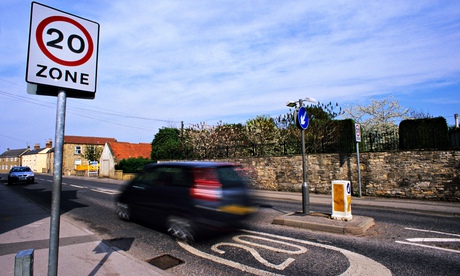
The national speed limit in built-up areas should be cut to 20mph to reduce the death toll of children on the roads, the Royal College of Paediatrics and Child Health has said.
The college has challenged the next government to implement the new limit as part of a set of measures that it says would help reduce the UK’s child mortality rate – the second worst in Europe – and radically improve the state of child health.
Forty-six councils have already introduced or are in the process of implementing a 20mph limit in residential areas, and another 12 are committed to doing so, according to the campaign group 20’s Plenty for Us. But the RCPCH believes the government should act.
The college’s president, Dr Hilary Cass, said: “It’s an evidence-based recommendation. The risk has been shown and we do know that the chance of a child being seriously injured or killed increases exponentially as your speed goes up. In built-up areas in 2011, 25 child pedestrians were killed and 311 adult pedestrians. When you look at the life years lost under these circumstances, it’s huge.”
A 1979 study suggested that a pedestrian had a 20% chance of being fatally injured when hit by a vehicle at 30mph, and a 2.5% chance at 20mph. An analysis of 20 years’ worth of data published in 2009 associated the introduction of 20mph zones with a more than 40% reduction in road casualties.
On Monday the road safety charity Brake published the results of a survey of more than 4,000 primary school children which found that two in five said they had been hit or nearly hit by a vehicle while on foot or bike.
Brake’s spokesman James McLouglin welcomed the college’s intervention. “We’ve reached a tipping point where it makes sense for the government to change the national default from 30 to 20mph,” he said. “This would lead to financial savings and remove administrative barriers for other local authorities.”
In its Vision for 2015 report the RCPCH also calls for the introduction of graduated licensing schemes, which place restrictions on novice drivers until they have built up their experience.
Other recommendations to reduce the estimated 2,000 excess deaths of children in the UK compared with Sweden, which is the best performing country in Europe on child mortality, include restricting young people’s access to alcohol, including through a minimum unit price, and tackling child poverty and inequality, which are key risk factors for child mortality.
The health of children could be improved by imposing a ban on junk food advertising on television before 9pm, training every GP and practice nurse in children’s mental and physical health and ensuring every child has a named doctor, the RCPCH says.
Cass said successive governments had focused on the UK’s ageing population to the detriment of children, storing up potential problems for future generations.
A Department for Transport spokeswoman said: “Setting speed limits on local roads is a matter for local authorities but this government produced guidance which has made it easier for councils to introduce 20mph zones as research shows these limits can save lives.”

